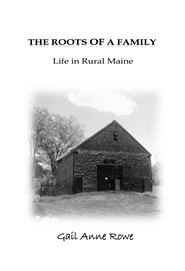What stories do we tell ourselves that define who we are — to ourselves and others? As is the case in many families, the unbroken chain of life that reaches down through the generations presents significant challenges to our knowing or discovering “where we come from,” even when family roots run deep in one place.
This was the truth for Gail Anne Rowe, a native Mainer, when she set out to write of her family in “The Roots of a Family: Life in Rural Maine.” The spark that ignited the quest to know more was a photo of her grandmother, Clara McGinley. In the photo, Clara was 54, but looked to be 80. Rowe writes: “I cannot imagine the burden this woman shouldered, what she endured. You can see it — that enduring — clearly in her face. It was at the moment I saw that photo that I decided to tell this story.”
Rowe was surprised how few stories her mother could tell of her parents and grandparents, despite the family’s long residence in Winn, a small community northeast of Bangor. That dearth did not, however, deter her.
Though Rowe’s recounting reaches back five and six generations, much of the heart of this book centers around Clara, her maternal grandmother, and Fred Glidden, her paternal grandfather, whose family settled in Orrington (of which Brewer was once a part).
Clara’s parents were French Catholics. Her husband, Bert McGinley, was Irish. Both the Catholics and the Irish were the partial impetus for the revival of the Ku Klux Klan in Maine in the 1920s. That prejudice created a barrier for Rowe, in that some family stories were hidden or distorted.
Clara and Bert lived in a four-room house where they raised 16 children to adulthood — without the benefit of electricity or indoor plumbing. The growing family always ate together, though in shifts, for there weren’t enough plates and space at the table to feed everyone at once. In total, Clara was pregnant the equivalent of 12 years during a 25-year period. Most of the burden of caring for the family fell on Clara, as her husband wasn’t the “most ambitious of men.”
During the Depression, when the family couldn’t tithe to the Catholic Church as much as expected, they were turned away. No one in the family ever again attended the church — excepting Clara. Despite her faithfulness, she was later denied being buried in the churchyard because she had failed her “Easter duties” — for being sick at home.
Rowe’s father’s parents lived on a farm in Orrington, where they maintained a dairy herd and operated a small, local milk delivery business. In the winter they cut ice from the pond and preserved it for delivery in the summer. The Gliddens were not wealthy, but did have the creature comforts of electricity and indoor plumbing. When rural electrification really took hold, and new government regulations over dairy operations went into effect after World War II, Fred was forced to give up both his milk and ice delivery business and take a job as a bank security guard in Bangor.
Rowe’s paternal grandmother was not keen on her father marrying a McGinley. Mother and son carried on an extended correspondence over the issue while he was overseas during the war. Despite his mother’s nefarious meddling, Robert did indeed return and marry his sweetheart. He built their home a mile down the road from his parents’ farm, where they raised a son and two daughters — the middle child being Gail Anne.
The book, for what it is — a family genealogy — is well done. In striving to be something more, a history, biography and memoir, it is only moderately successful, primarily because the various pieces don’t easily meld seamlessly. There are historical gems throughout, but there is also a lot of family accounting that would be of interest primarily to just family and friends, including a litany of betroths and begats covering all of Clara’s 16 children. Other sections of this self-published book could have benefited from trimming as well. But we learn that because of the Spanish flu and the frequency with which families laid out members in their parlors — earning the distinction as the “dead room,” the Ladies Home Journal encouraged after the epidemic that it be renamed the “living room.” We learn, too, that a half-acre of potatoes could feed a family for a year. And that at one time you could get a lifetime two-deer-a-year hunting license for 25 cents.
The book does convey something of a time and a place and a way of life that is growing increasingly difficult to imagine. It speaks, too, to the strength of character of many of the McGinleys and Gliddens of Maine. Rowe recounts her mother telling her at one point that she “was always grateful for what we did have. How all that was accomplished, in such a small house with so little — to be the family that we were — has got to come from some strong people.”
Frank O Smith is a Maine writer, ghostwriter, writing coach and teacher. He can be contacted at:
www.thewritinggroup.com
Send questions/comments to the editors.



Success. Please wait for the page to reload. If the page does not reload within 5 seconds, please refresh the page.
Enter your email and password to access comments.
Hi, to comment on stories you must . This profile is in addition to your subscription and website login.
Already have a commenting profile? .
Invalid username/password.
Please check your email to confirm and complete your registration.
Only subscribers are eligible to post comments. Please subscribe or login first for digital access. Here’s why.
Use the form below to reset your password. When you've submitted your account email, we will send an email with a reset code.